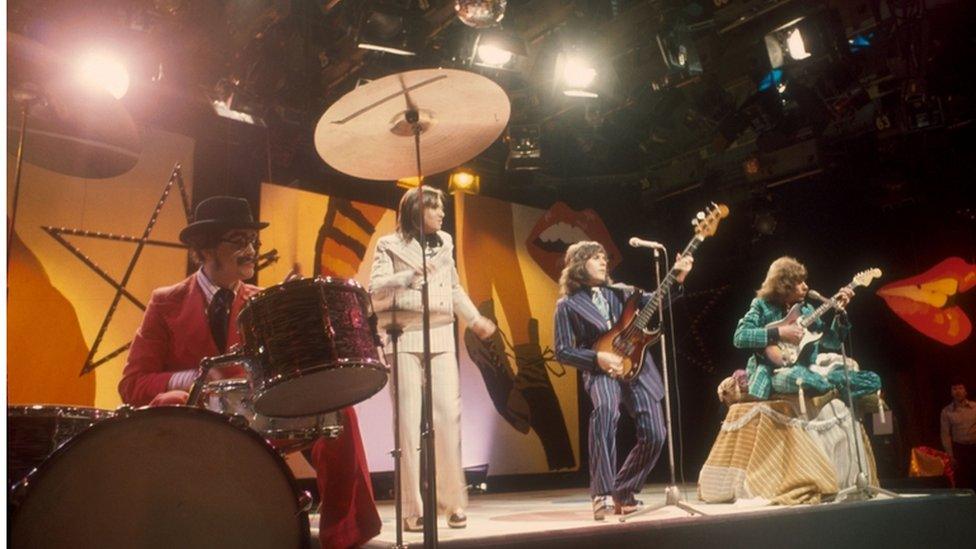Should we stop listening to these Christmas songs?
- Published
- comments
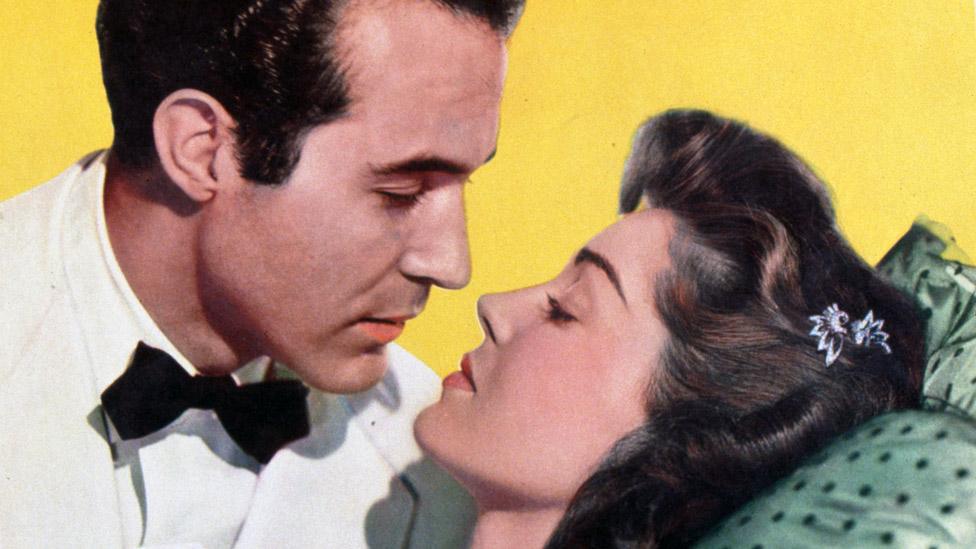
Ricardo Montalban and Esther Williams sang Baby, It's Cold Outside in the 1949 film Neptune's Daughter
Baby, It's Cold Outside is one of those Christmas songs that's about as traditional as mince pies.
But an American radio station's decision to pull it from playlists because it's seen as unsuitable in the #MeToo era has reignited a debate about the song, and raised questions about other potentially questionable Christmas classics.
Baby, It's Cold Outside found a wide audience as a duet between Ricardo Montalban and Esther Williams in the 1949 film Neptune's Daughter, and in recent years has been covered by the likes of Lady Gaga and Michael Bublé.
Critics of the song see it as the story of a man pressuring a woman into spending the night when she doesn't want to.
In particular, the line "Say what's in this drink?/No cabs to be had out there" has led people to make a link with date rape.
Glenn Anderson, a DJ on Star 102, said the lyrics now felt "manipulative and wrong", and that it has no place in a world where people are "extra sensitive".
However, a former English teacher wrote a feminist defence of the song in a viral Tumblr post, external, suggesting the woman "is excusing her uncharacteristically bold behaviour (either to the guy or to herself) by blaming it on the drink".
"It is not a joke about how she's drunk and about to be raped," the blog's author wrote.
"It's a joke about how she's perfectly sober and about to have awesome consensual sex and use the drink for plausible deniability because she's living in a society where women aren't supposed to have sexual agency."
Opinion on social media has been mixed.
Allow X content?
This article contains content provided by X. We ask for your permission before anything is loaded, as they may be using cookies and other technologies. You may want to read X’s cookie policy, external and privacy policy, external before accepting. To view this content choose ‘accept and continue’.
Allow X content?
This article contains content provided by X. We ask for your permission before anything is loaded, as they may be using cookies and other technologies. You may want to read X’s cookie policy, external and privacy policy, external before accepting. To view this content choose ‘accept and continue’.
Allow X content?
This article contains content provided by X. We ask for your permission before anything is loaded, as they may be using cookies and other technologies. You may want to read X’s cookie policy, external and privacy policy, external before accepting. To view this content choose ‘accept and continue’.
BBC Middle East editor Jeremy Bowen revealed that the proposition-in-a-song even had an influence on global geopolitics.
Allow X content?
This article contains content provided by X. We ask for your permission before anything is loaded, as they may be using cookies and other technologies. You may want to read X’s cookie policy, external and privacy policy, external before accepting. To view this content choose ‘accept and continue’.
Lee Thompson, a music consultant who has worked in radio and TV for more than 30 years, thinks debates over such songs have grown in recent years.
"In all of my time working at radio stations, I've never had anyone come to me and say 'we shouldn't play a song'," he says.
"It only seems to be in the last few years that the sensitivity around particular songs are magnified. I think social media is responsible for magnifying these arguments nowadays.
"Some people think, 'since this is my interpretation of the song, therefore everyone else needs to think its the correct interpretation of the song'."
Baby, It's Cold Outside isn't the only seasonal song that some people find problematic.
Fairytale of New York
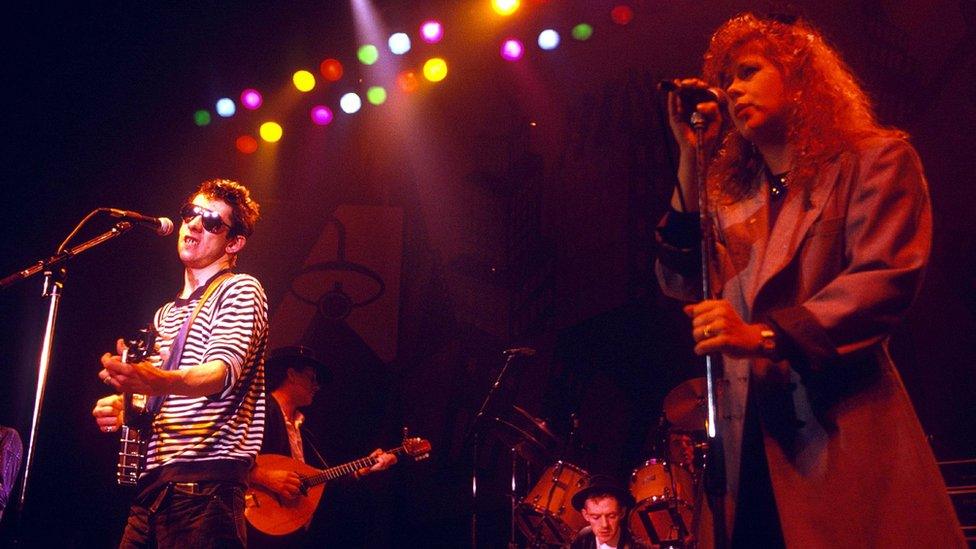
The Pogues and Kirsty MacColl first had a hit with the song in 1987
In 2007, BBC Radio 1 edited out the words "faggot" and "slut" from The Pogues' Fairytale of New York to avoid offence. But later that evening, the station changed its mind after criticism from listeners.
Justin Myers, a columnist for GQ Magazine, wrote on his blog, external in November how allowing the song to be played on radio uncensored "legitimises" the slur and "burdens" the LGBT+ community.
"The word still has power, sharp cruel fangs, and is still used to demean and destroy lives of young people up and down the UK," he said.
The song is heading back into the UK top 40 this week, however, as it has done for the past 13 Decembers, since downloading and streaming made it easier for old tunes to resurface.
Magic Radio - which has devoted itself to Christmas songs for the month of December - has said it will keep playing both Baby, It's Cold Outside and Fairytale of New York this year.
A spokeswoman for BBC Radio declined to say whether its stations would play the tunes. The BBC doesn't ban songs, she said - but "tracks are chosen on musical merit and their relevance to our audience on a case-by-case basis".
Do They Know It's Christmas?
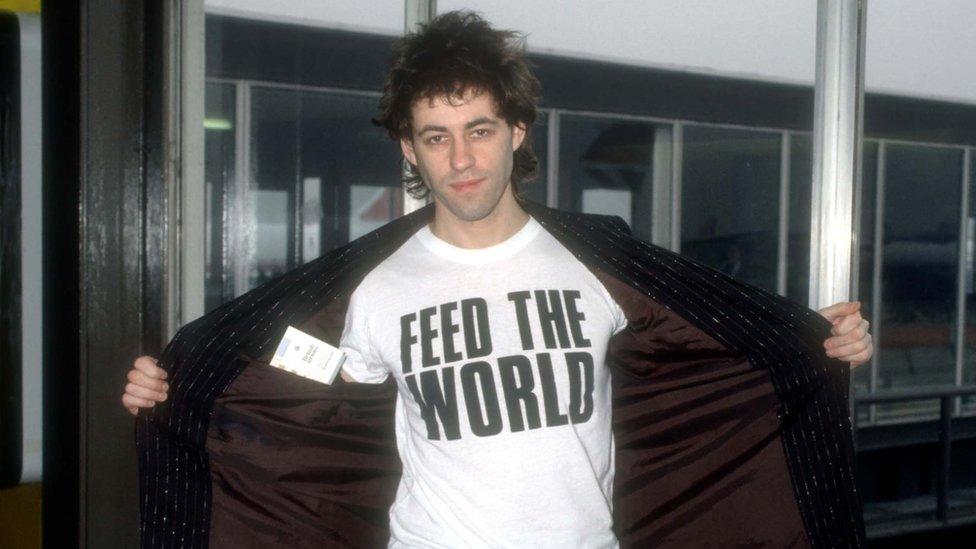
Bob Geldof gave critics of the lyrics characteristically short shrift
Despite being written to raise funds to combat famine in Ethiopia, the 1984 song doesn't refer to the country at all but rather the entire continent, leading to accusations that it fuels the tired trope that everywhere in Africa is the same, rather than a place filled with distinct countries, each with their own unique culture.
"There exists a paternalistic way of thinking about Africa, likely exacerbated by the original (and the second, and the third) Band Aid singles, in which it must be 'saved', and usually from itself. We say 'Africa' in a way that we would never say 'Europe', or 'Asia'," wrote Bim Adewunmi in The Guardian in 2014, external.
She also pointed out that the lyrics reflected a "popular narrative" that those in the West were the "benevolent elders, helping out poor Africans, mouths always needy and yawning".
Co-writer Bob Geldof gave the critics short shrift, external, saying: "It's a pop song, it's not a doctoral thesis."
The original record raised £8m for famine relief by selling 3.8 million copies, making it the second biggest-selling single in UK chart history.
Jingle Bells
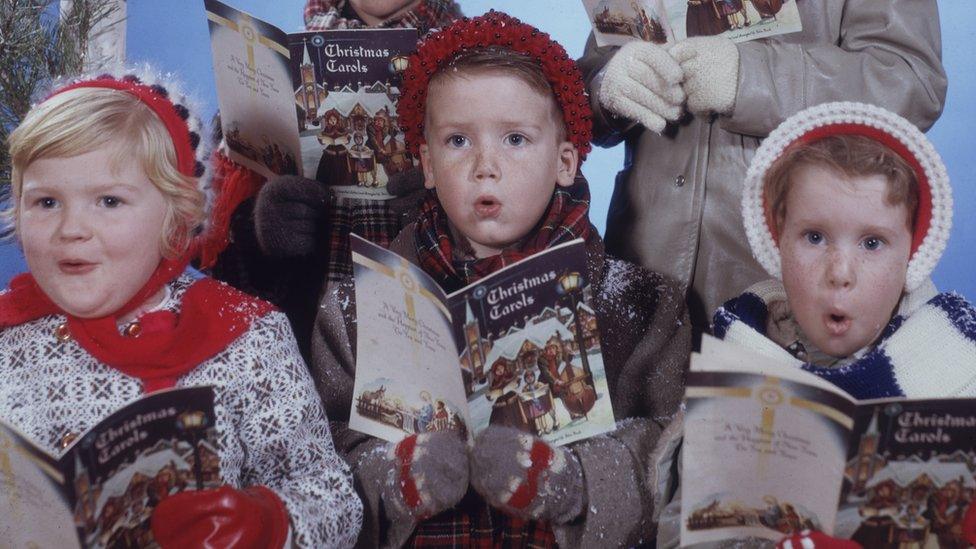
Before you tweet "PC gone mad!" in all caps, read the following information first.
In 2017, Professor Kyna Hamill of Boston University published a research paper, external outlining the racist origins of the beloved Christmas ditty.
Her peer-reviewed paper found that the song was originally performed in blackface in a minstrel show as One Horse Open Sleigh in Boston in September 1857.
The song was written by James Pierpont, who was desperate for work after failing at other professional ventures, and Prof Hamill's research suggests he "capitalised on minstrel music" and used making fun of black people in the snow as a "'safe' ground" for his show.
Prof Hamill has said it wasn't her intention, external to stop your kids from singing this particular tune, however.

Follow us on Facebook, external, on Twitter @BBCNewsEnts, external, or on Instagram at bbcnewsents, external. If you have a story suggestion email entertainment.news@bbc.co.uk.
- Published1 December 2018
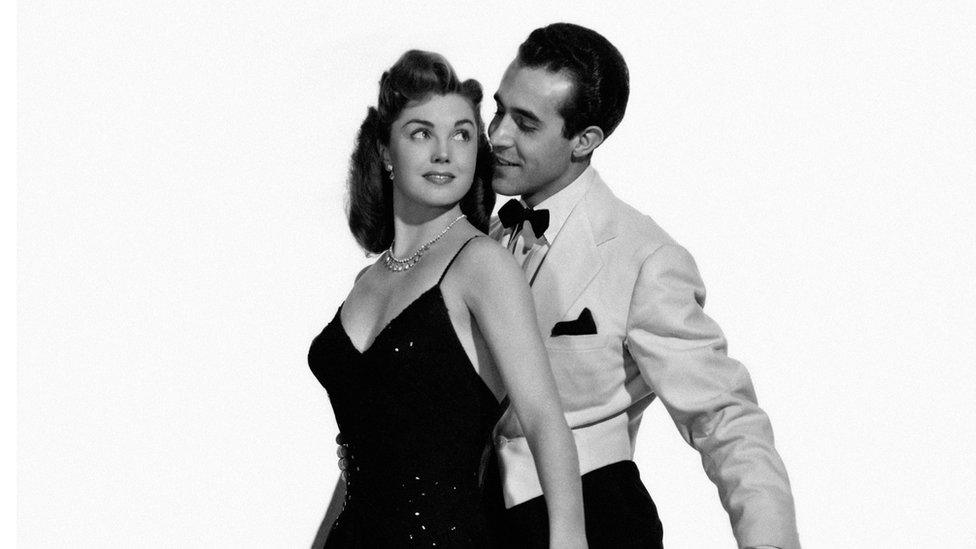
- Published17 December 2017
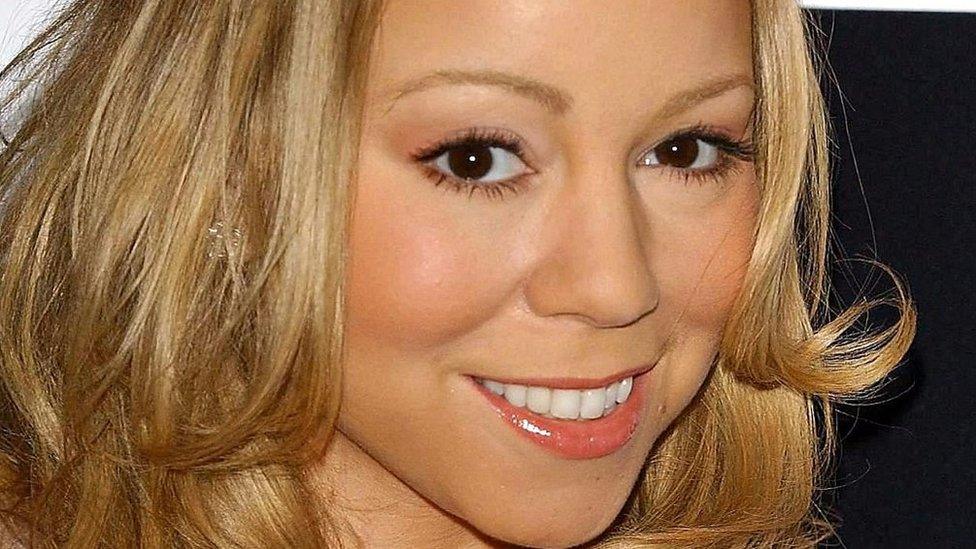
- Published23 December 2017
